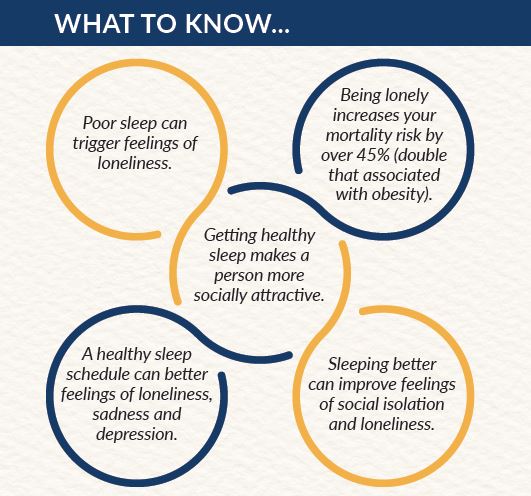Sleep loss is a significant contributing factor to the public health crisis of loneliness
Perhaps you’ve noticed in your own life that when you sleep less, you are less likely to call up a friend or go out to a social gathering. But would it surprise you to know that this loneliness caused by a lack of sleep is contagious? A group of researchers at UC Berkeley’s Center for Human Sleep Science directed by Professor Matthew Walker found just that. Dr. Eti Ben-Simon explains, “We were initially interested to know if people were less inclined to interact with others if they did not sleep. So, our first question was more focused on becoming socially withdrawn following sleep deprivation. We soon realized that both loneliness and social withdrawal pose major risks to health and are linked to worse sleep.” With the knowledge that lack of sleep can cause feelings of loneliness, the group studied further, using functional MRI and electrical brain recordings to take a closer look at neural processes that trigger lower socioemotional functioning following lack of sleep, as well as how to restore these processes back to regular levels after healthy sleep.

“Our discoveries demonstrate that sleep loss acts as a social repellant, in which both sides of the social interaction turn away from each other,” Dr. Ben-Simon states. “In an analysis of more than 1,350 research participants, we observed this effect across behavioral, brain and societal levels.” This research identified several new ideas.
1.) Less sleep leads to less social interaction. “Sleep loss—both total deprivation and moderate night-to-night reductions—leads individuals to become more antisocial as it enforces the feeling to have distance from others.
2.) This sleep-loss effect includes over- and under-performing in parts of the brain. The neural processes involved in this antisocial sleep-loss effect include hypersensitivity in the brain regions that warn of incoming social contact (also known as the “near space network”). At the same time, the brain regions that normally encourage social engagement and understanding of another’s intent (known as the “theory of mind network”) are impaired.
3.) Strangers are more likely to mistake the sleep-deprived as lonely. Of real societal importance, independent judges with no prior knowledge of sleep deprivation’s brain connection view sleep-deprived participants as being significantly lonelier. When those same participants are well-rested, they are perceived as less lonely.
4.) Strangers do not want to connect with the sleep-deprived. When the independent judges were asked if they would like to connect with the study participants in either a social way or a collaboration, they were less likely to when the participant was sleep-deprived. “This demonstrates that the state of sleep loss is a powerful social repellant,” Dr. Ben-Simon concludes.
5.) Loneliness caused by a lack of sleep is contagious. Finally, the group of researchers made the key discovery that the antisocial impact of sleep deprivation is transmissible. When the independent judges came in contact with a sleep-deprived participant, the judge reported feeling lonelier as a result. This strange finding was true even if the judge spent as little as 60 seconds interacting with the participant. Dr. Ben-Simon says, “I have been studying sleep for about a decade now and I was surprised to find evidence that loneliness caused by a lack of sleep is contagious.”
SLEEP, SOCIAL INTERACTION & SHELTERING IN PLACE
The pandemic has changed how we socially interact with others. It has also reduced the likelihood of getting good quality, refreshing sleep for many people. Given that poor sleep can trigger feelings of loneliness and vice versa, it is especially important to protect our sleep during this time. “We need to invest the time to socially connect with others even if we cannot physically be with them,” Dr. Ben-Simon suggests. “One advice that can help in terms of protecting sleep is to try and keep the same sleep schedule even if we have a more flexible routine these days. Going to sleep and waking up at roughly the same time every day (including weekends) is a great way to ensure we get all the sleep that we need every single night.”
Sleep can be viewed as something that takes us away from social activity, such as turning down a social gathering in order to get the sleep we need. Dr. Ben-Simon concludes by saying, “We human beings were not designed to be alone. Sleep is a glue that, biologically and psychologically, glues us together as a species. Sleep reconnects us with our social circle; with our friends, colleagues, partners and even with strangers.”

……………………………………………….
Eti Ben-Simon, PhD is a Postdoctoral Fellow in the Center for Human Sleep Science at the University of California Berkeley. She has been working in the field of sleep medicine and research for over ten years. Her fascination with sleep started as a child when she was amazed at how a good night of sleep could make everything feel magically better the next day.
……………………………………………….
Gina Dewink is a published freelance writer and author acting as Editor of Healthier Sleep Magazine.



